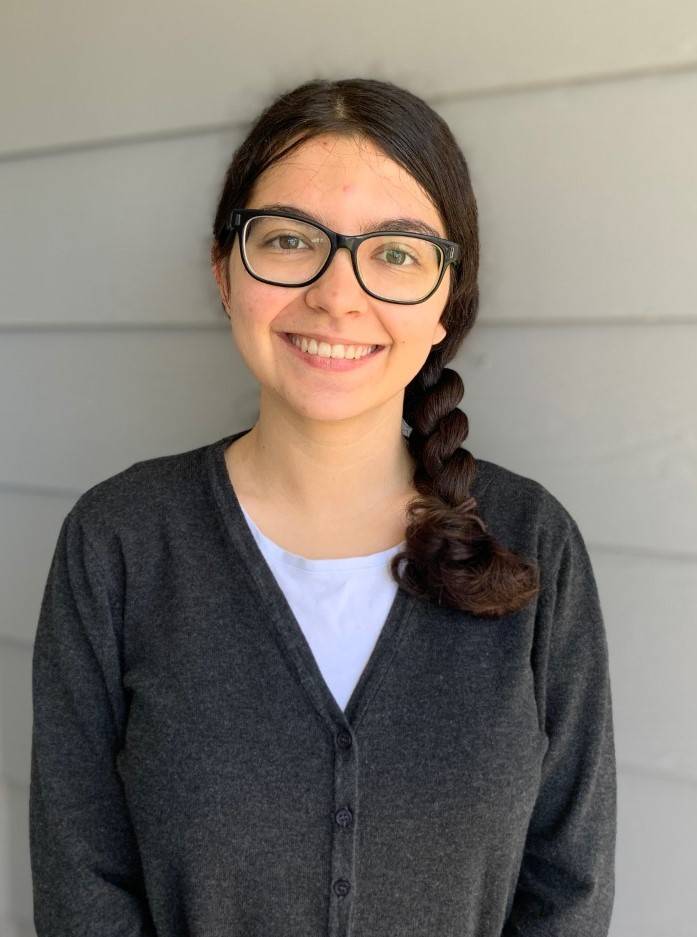Samantha Aziz Selected as an NSF GRFP Awardee

The Graduate College is pleased to announce that Samantha Aziz has been selected as an awardee in the 2020 National Science Foundation (NSF) Graduate Research Fellowship Program (GRFP) competition! The NSF GRFP recognizes and supports outstanding graduate students in STEM and NSF-supported social science disciplines who are pursuing research-based master’s and doctoral degrees. Fellows receive an annual stipend of $34,000 and full tuition and fees for up to three years.
What is your academic background?
Prior to graduating high school, I earned an associate degree at El Paso Community College and spent some time at the University of Texas at El Paso (UTEP). I came to Texas State University immediately after finishing high school, where I developed an interest in human-computer interaction (HCI) research. I graduated in May 2020 with a Bachelor of Science in computer science from Texas State, where I am now pursuing a Ph.D. in computer science.
What is your current area of research and what significance does it hold?
I am currently conducting research in the field of eye movement biometrics. Specifically, I am investigating the potential use of eye movement for user authentication in mobile computing devices. Using eye movement for authentication is arguably more secure than existing biometric methods because it is substantially more difficult to spoof eye movement than it is to replicate a person’s fingerprint or facial structure. Research in this area has significant implications for the future of cybersecurity; successfully deploying eye movement-based authentication in ubiquitous mobile devices can make consumers less vulnerable to cybercrime as they perform increasingly sensitive activities online.
Who is your research advisor?
Dr. Oleg Komogortsev, Professor in the Department of Computer Science.
How did you become interested in your field?
By happenstance! I experienced very little support for STEM career exploration before entering university. Computer science education requires technological resources that many underfunded schools—including mine—were simply not equipped to provide. I cultivated my initial interest in computer science by joining app design competitions and outreach programs hosted by nonprofit organizations, and then by declaring computer science as my major at Texas State. Once I began formal coursework through my major, I became deeply invested in the field, which drove me to start tutoring computer science classes through Texas State’s Supplemental Instruction program and subsequently begin research work under Dr. Komogortsev’s advisement.
Have you received other honors and awards during your academic career?
I have received a Doctoral Merit Fellowship from The Graduate College, an Undergraduate Academic Excellence Award from the Department of Computer Science, and a National Merit Scholarship.
What did you learn about the process of applying for the GRFP and what do you think contributed to your selection as a finalist?
Building a high-quality GRF application requires a surprising amount of self-reflection. By the time I was finished with the application process, I was able to appreciate the growth I experienced through my academic career. I think that my undergraduate research experience made the biggest contribution to my selection as a finalist. I am very lucky to be involved with research that I am deeply enthusiastic about, and I think that my investment in the topic and excellent research advisor gave me the drive and direction I needed to experience success early in my career.
What advice would you give to future applicants?
As you complete your application, it’s important to remember that every GRF applicant is presenting a carefully curated version of themselves! It is dangerously easy to become discouraged by the accomplishments of people who were previously awarded, especially when you start comparing your early personal statement drafts to their polished personal statements. Approaching these statements with the right frame of mind can help you maximize the benefit of reading them in the first place. I gained a lot of insight by focusing on what the authors were trying to convey about themselves through their accomplishments, rather than the accomplishments themselves. Once I started finding character traits with which I identified in other people’s personal statements, it became much easier to write my own personal statement in a meaningful way.
Are there any other personal or scholastic attributes that you’d like to share?
I would like to emphasize that I have benefitted tremendously from the strong support system that Texas State has in place for students like me. I can attribute my own success to the support I received through advising, professional development in tutoring/research, and especially through the stellar faculty/staff in the Department of Computer Science.
This interview has been edited for length and clarity.